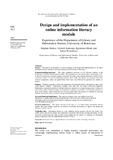Design and implementation of an online information literacy module: Experience of the Department of Library and Information Studies, University of Botswana
Date
2006Author
Mutula, S.
Kalusopa, T.
Moahi, K.
Wamukoya, J.
Publisher
Emerald Publishing Group td; www.emeraldinsight.com/oir.htmType
ArticleMetadata
Show full item recordAbstract
Purpose - The purpose of this paper is to present findings of the design and implementation of an online information literacy module to first-year students at the University of Botswana. Design/methodology/approach - The study population consisted of 103 first-year students in the Department of Library and Information Studies. The population was divided into three equal groups of 34, 34 and 35, respectively, and each assigned a two-hour slot in the smart computer laboratory weekly for five consecutive weeks, to cover five information literacy topics online. Each group was assigned a tutor who received assignments online and graded them. Each topic was followed by questions for students to answer. Findings - Findings generally revealed that impartation of information literacy through the online mode could improve students' competencies perhaps more than the face-to-face instruction approach. Furthermore, respondents preferred a blended instruction approach to a single learning mode. Contrary to expectations, online instruction might not minimise the copying of each other's work among students to a great extent. Finally, online instruction does not necessarily reduce the amount of workload for staff and students, instead more time is needed to design and administer the course. Research limitations/implications - The study was limited to first year students in the LIS department. A similar study involving all departments in the University of Botswana would shed more light on the level of information literacy competency among first year students from a cross-disciplinary perspective. Practical implications - The major outcome of the study is a re-usable online information literacy module. The study findings could also be useful in developing interventions to improve the design and delivery of online courses. Originality/value - Information literacy is a key challenge facing educators all over the world. Case studies such as this provide unique and comparative experiences that advance existing knowledge. For the University of Botswana, the study provides a first insight into the impact of e-learning on information literacy competency since the implementation WebCT in 2002.

